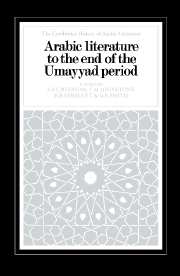Book contents
- Frontmatter
- Contents
- Editorial introduction
- 1 The tribes of pre-Islamic Arabia
- 2 The Umayyad Empire, c. A.D. 750
- 1 Background topics
- 2 Pre-Islamic poetry
- 3 Early Arabic prose
- 4 The beginnings of Arabic prose literature: the epistolary genre
- 5 The role of parallelism in Arabic prose
- 6 The Qur'ān-I
- 7 The Qur'ān–II
- 8 Qiṣaṣ elements in the Qur'ān
- 9 Aspects of the Qur'ān today
- 10 Ḥadīth literature–I: The development of the science of Ḥadīth
- 11 Ḥadīth literature-II: Collection and transmission of Ḥadīth
- 12 Shī'ī Ḥadīth
- 13 Narrative elements in the Ḥadīth literature
- 14 European criticism of Ḥadīth literature
- 15 The impact of the Qur'ān and Ḥadīth on medieval Arabic literature
- 16 The Maghāzī literature
- 17 The Sīrah literature
- 18 The poetry of the Sīrah literature
- 19 Fables and legends in pre-Islamic and early Islamic times
- 20 Umayyad poetry
- 21 Music and verse
- 22 The Greek impact on Arabic literature
- 23 The Persian impact on Arabic literature
- 24 The Syrian impact on Arabic literature
- Appendix Bibliography of translations of the Qur'ān into European languages
- Glossary
- List of sources
- Index
14 - European criticism of Ḥadīth literature
Published online by Cambridge University Press: 28 May 2012
- Frontmatter
- Contents
- Editorial introduction
- 1 The tribes of pre-Islamic Arabia
- 2 The Umayyad Empire, c. A.D. 750
- 1 Background topics
- 2 Pre-Islamic poetry
- 3 Early Arabic prose
- 4 The beginnings of Arabic prose literature: the epistolary genre
- 5 The role of parallelism in Arabic prose
- 6 The Qur'ān-I
- 7 The Qur'ān–II
- 8 Qiṣaṣ elements in the Qur'ān
- 9 Aspects of the Qur'ān today
- 10 Ḥadīth literature–I: The development of the science of Ḥadīth
- 11 Ḥadīth literature-II: Collection and transmission of Ḥadīth
- 12 Shī'ī Ḥadīth
- 13 Narrative elements in the Ḥadīth literature
- 14 European criticism of Ḥadīth literature
- 15 The impact of the Qur'ān and Ḥadīth on medieval Arabic literature
- 16 The Maghāzī literature
- 17 The Sīrah literature
- 18 The poetry of the Sīrah literature
- 19 Fables and legends in pre-Islamic and early Islamic times
- 20 Umayyad poetry
- 21 Music and verse
- 22 The Greek impact on Arabic literature
- 23 The Persian impact on Arabic literature
- 24 The Syrian impact on Arabic literature
- Appendix Bibliography of translations of the Qur'ān into European languages
- Glossary
- List of sources
- Index
Summary
“Dans cet ensemble gigantesque constitué par les Ḥadīths, chaque ecole a puise ce qui paraissait venir à l'appui de sa propre doctrine, et a repoussé ce qui la gênait.” This statement represents a fair summary of the current view of Western scholarship on the role played by Ḥadīth in the development of Islamic legal doctrine. According to traditional Islamic jurisprudence the Ḥadīth, particularly those recorded in the six “canonical” collections of the third/ninth century, constitute an authentic record of the legal precedents, or sunnah, set by the Prophet Muhammad, and as such were regarded as a primary source of law, providing both an interpretation of, and a supplement to, the legal provisions of the Qur'ān itself. European scepticism over this view, however, stemming largely from the fact that the Ḥadīth embody considerable conflict and contradiction of substance, has eventually led to the conclusion that the ascription of legal doctrines to the Prophet was largely apocryphal and that the great mass of Ḥadīth originated in the second/eighth century, thus representing very much a secondary stage in the growth of legal doctrine.
Muslim scholars themselves were, of course, intensely conscious of the possibility of fabrication of Ḥadīth, But their test for authenticity was confined to an investigation of the chain of transmitters (isnād) who narrated the report. Provided the chain was uninterrupted and its individual links deemed trustworthy persons, the Ḥadīth was accepted as binding law.
- Type
- Chapter
- Information
- Arabic Literature to the End of the Umayyad Period , pp. 317 - 321Publisher: Cambridge University PressPrint publication year: 1983
- 1
- Cited by



